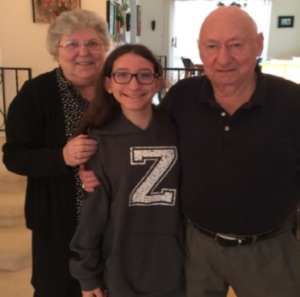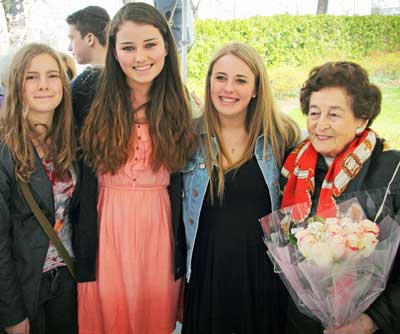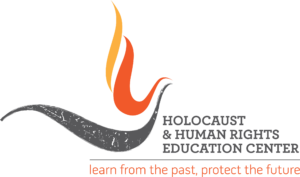Twin with a Survivor Program
The Holocaust & Human Rights Education Center is pleased to partner with The Holocaust Council of Greater MetroWest's Twin-With-a-Survivor program. They created this program in 2001 to provide B’nai Mitzvah students the rare opportunity to make personal connections to these extraordinary models of human courage and resiliency who exemplify continued commitment to the Jewish community.

"For they were living men and women, not symbols." - Elie Wiesel
Overview
After three meetings with a Survivor the student incorporates what he/she has learned into the D’var Torah.
Twin-With-a-Survivor assures that the Bar/Bat Mitzvah ceremony is profoundly meaningful and extremely moving for the participants as well as the entire congregation.
Additionally, participating in this program ensures the fulfillment of several mitzvot, including becoming a witness and honoring the elderly.
Twin-With-a-Survivor has proven a tremendous growth opportunity for both the students and their families. Many loving friendships have resulted between Survivors and the B’nai Mitzvah families.

Guidelines
- Students must agree to meet a Survivor a minimum of three times (although more than three meetings are recommended). At least one meeting should take place in the Survivor’s home (or place of business). We recommend a minimum of one hour per session.
- If possible, a portion of one of these meetings should be videotaped. Three copies of the tape will be made. The copies will be distributed to the student, the Survivor and to The Holocaust & Human Rights Education Center.
- Students must agree to keep journals of their meetings. These portions should include the factual materials of the interviews that become future references for the student.
Minimal considerations should include:
- Is the student knowledgeable about the Holocaust?
- Is the student stable and mature?
- Does the student have a respectable GPA?
- Will the student have parental support for this project?
Although we don’t anticipate that either the Survivor or student will be tongue-tied, we recommend that the student approach each of the interviews with a set of guideline questions that explore different aspects of the Survivor’s life. Students should realize that three sessions is hardly enough time to learn someone’s history. The guidelines will ensure that the most important aspects of the Survivor’s story will be addressed.
Should the pair decide that they want to spend more time together, the Survivor will be able to elaborate on the individual aspects. Otherwise, the students should present the Survivors with a list of questions for each particular interview so that the Survivor can gauge how much ground he/she will have to cover in the given time.
Minimally, the students should ask:
- Place and date of birth. This should be followed up by consulting an atlas to get a geographical sense and an encyclopedia for a historical perspective of that Survivor’s particular country.
- Lifestyle of the Jews in general and the Survivor’s family, in particular.
- Detailed knowledge of parents, siblings, and grandparents, with specific anecdotes. Anecdotes about extended family and childhood friends.
- Religious, social, educational, and economic life of the surrounding Jewish and non-Jewish community.
- Details of the Survivor’s life from earliest recollection to point of transition (1930’s)
- Transition to 1945: oppression, ghetto, hiding, concentration camp experience, partisan activity, and emigration to sanctuary.
- Liberation, return to home, D.P. camp, wait to emigrate to America or Palestine
- Life in a new land
Suggested Questions:
- When did you arrive in the United States?
- Did you arrive by ship or plane?
- What was your first impression of America?
- Why did you choose to settle in New York?
- Describe the town or city as it appeared to you when you first arrived.
- Did it in any way remind you of your home in Europe? If yes, how?
- Did you feel welcome in the United States? If yes, what particularly made you feel welcome? If you were made to feel unwelcome, please explain.
- Please describe your employment history: first job and subsequent ones.
- Please describe your first and subsequent homes in the United States.
- Did you attend night classes to learn English? Please describe that experience.
- Did you send your children to area schools and colleges?
- What do you consider the best thing about living in New York?
- What are your thoughts on life, relationship with others, prayer, Judaism, religious observance, children, and grandchildren.
